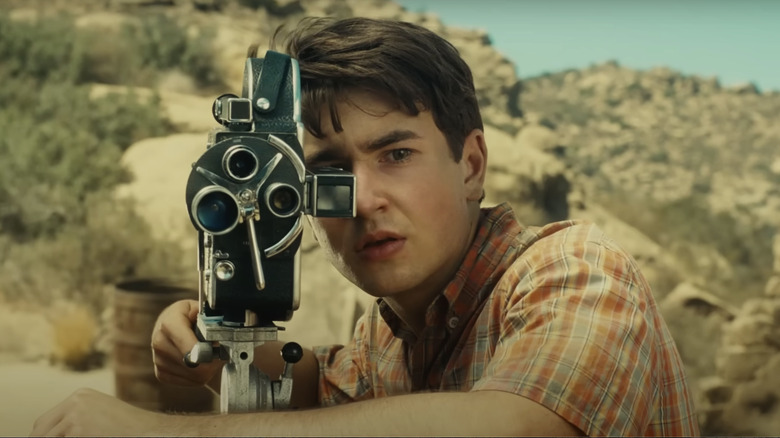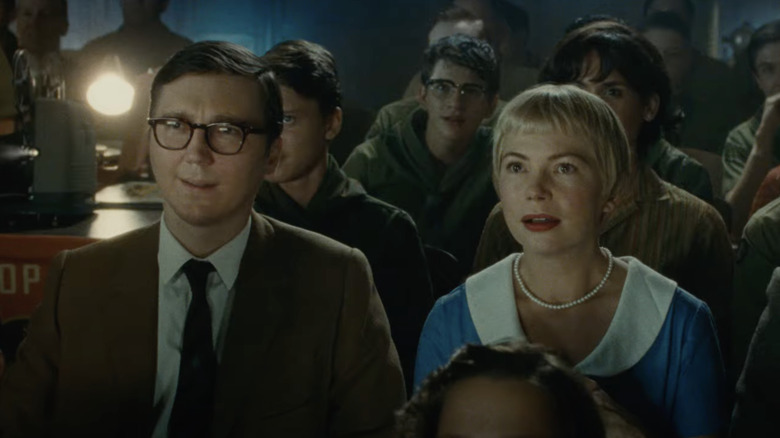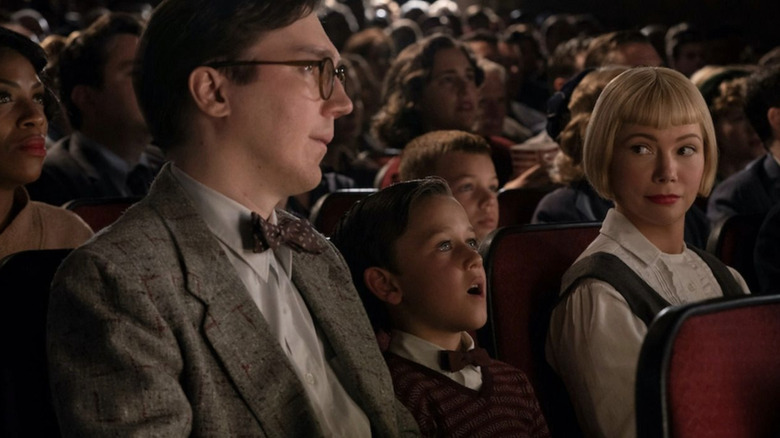Tony Kushner Says The Fabelmans Is 'About The Power Of Art' [Exclusive]
Steven Spielberg's latest film, "The Fabelmans," looks to be one of his most personal projects yet. Co-written by Spielberg (his first co-writing credit with Tony Kushner), the film gives insight into the iconic director's childhood and the events that led him to become a filmmaker. In place of Spielberg is the fictional Fabelman family, making the coming-of-age drama film only semi-autobiographical. While names and locations may have changed for the project, the strong ties to Spielberg's upbringing and the beliefs embedded within them are still very much authentic to the nature of the director.
One such belief showcased in the film is the power of art — the ability of different mediums, whether it be music, art, or movies, to impact and affect a person profoundly. The premise of "The Fabelmans" is primarily centered around the inspiration film has on its main character and how even when Sammy Fabelman is pursuing his filmmaking dreams, there are still unexpected truths and power in the art that can affect an artist, whether they want it to or not. A big proponent of the spontaneous impact art can have on a person is Tony Kushner, Spielberg's co-writer, who believes "The Fabelmans" expertly captures the power of art.
The indirect impact of art
In /Film's exclusive interview with "The Fabelmans" co-writer, Tony Kushner talked about a bullying subplot that plays into the semi-autobiographical aspects of the film while simultaneously reflecting the way art can indirectly affect a person:
"[The bullies are] in the movie because the main part of that story is from [Spielberg's] memories. It's something that he told me. So the mysterious thing that happens at the end of that sequence, which I think is important to the whole film, we had to really think through why it turned out this way. When Steven was a kid, and it happened to him, he's like Sammy in the movie: 'What the f*** was that?'
I feel really happy about how resolved and unresolved its lessons are because it's kind of a mystery because it's about the power of art."
To Kushner, the bullying scene in "The Fabelmans" is clearly emblematic of the entire film's message. There are parts of storytelling and artistic pursuits that can profoundly affect a person in unexpected ways. According to Kushner, this power affects not just the creator but also those who view the art and interpret it in ways the creator cannot anticipate. From the marketing of the movie, it's clear "The Fabelmans" has a focus not only on how filmmaking affected Spielberg, but how his pursuit of storytelling affected those around him.
The responsibilities of a storyteller
Kushner goes into greater detail about the themes of the movie and how the power of art is not something to be taken lightly. The recognition that an audience can interpret the art you make in all types of ways that the creator won't always be able to expect, even if you're a filmmaker as talented as Spielberg. He said:
"There's the power of the art that you can control the more you gain mastery of a particular form, and then there's the stuff that it does that you don't control, and you have to learn humility in the face of it. It is a real power in the world. It's not a direct power but an enormous indirect power. And you have to recognize that you're playing around with something of an enormous force in the world, and you shouldn't kid yourself, even if you're Steven Spielberg, that you know exactly what will happen because you made this. I mean, that's when bad art gets made."
Having a mastery of the form, as Spielberg arguably does, it's important to show responsibility and humility when telling a story. As Kushner points out, "bad art" is a real possibility for creators with close-mindedness, expecting their stories to be received in a specific way. Kushner has a moving outlook on Spielberg's work and the overall message of "The Fabelmans," and it's one that any aspiring storyteller should take into consideration:
"Wonderful things like the movies that he makes, there's a part of him that just says, 'Go out in the world, and I hope what I'm putting in the world is a thing for the good rather than for the bad.' And I think that's always been true. His work is, I think, for the good, but you have to surrender to the fact that you don't control it. And that, to me, in a way, became what the whole movie is really about."


